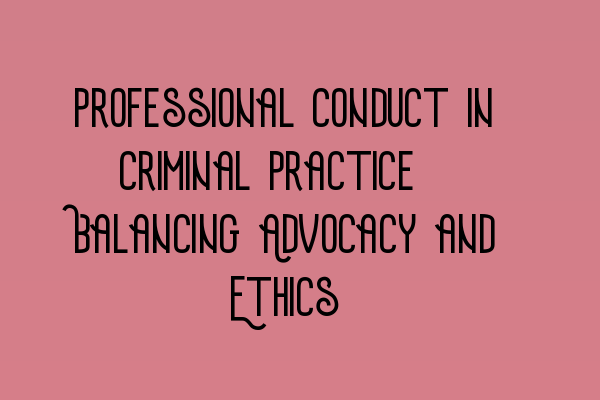Professional Conduct in Criminal Practice: Balancing Advocacy and Ethics
As criminal lawyers, it is essential that we navigate the complex terrain of professional conduct while zealously advocating for our clients. Balancing advocacy and ethics is a delicate art that requires a deep understanding of legal principles and ethical guidelines.
In the United Kingdom, the Solicitors Regulation Authority (SRA) has defined a set of rules and principles that govern the professional conduct of solicitors. These rules provide a framework within which criminal lawyers must operate to ensure the fair administration of justice.
One of the key elements of professional conduct in criminal practice is maintaining client confidentiality. As legal professionals, we have a duty to protect the information shared by our clients. This duty extends beyond the solicitor-client relationship and must be upheld unless legal obligations or the prevention of crime or fraud require disclosure.
Another important aspect of professional conduct is the duty to act in the best interests of the client. This means providing unbiased, objective advice and diligently representing the client’s case. However, this duty must be balanced with the duty to the court and the administration of justice. Criminal lawyers must not mislead the court or engage in conduct that undermines the integrity of the legal system.
Advocacy in Criminal Practice
Advocacy is a fundamental skill for criminal lawyers. Effectively presenting a client’s case requires the ability to analyze evidence, construct persuasive arguments, and engage with the court. However, advocacy must be conducted within the boundaries of professional ethics.
One of the challenges faced by criminal lawyers is managing the tension between zealous advocacy and the duty to act ethically. Zealous advocacy involves passionately representing the client’s interests and striving for the best possible outcome. However, it should not override one’s duty to the court and to uphold the principles of justice.
The SRA’s Code of Conduct emphasizes the need for criminal lawyers to present their cases fearlessly and resolutely while maintaining their integrity. It is crucial to remain objective, consider the interests of justice, and adhere to professional standards. By striking a balance between zealous advocacy and ethical conduct, criminal lawyers can fulfill their obligations to both their clients and the legal system.
The Role of Professional Development
Continuing professional development (CPD) is an essential aspect of maintaining professionalism in criminal practice. Staying updated about changes in legislation, case law, and ethical standards enables criminal lawyers to provide the most effective representation to their clients.
Participating in CPD courses, such as SQE 1 Preparation Courses and SQE 2 Preparation Courses, allows criminal lawyers to enhance their knowledge and skills. These courses cover various aspects of criminal law, advocacy techniques, and ethical considerations. They help lawyers understand the evolving legal landscape and equip them to navigate complex cases.
Regularly engaging in CPD not only benefits individual criminal lawyers but also contributes to the overall professionalism of the legal community. By continuously improving their knowledge and skills, lawyers can better serve their clients and uphold the highest standards of professional conduct.
Conclusion
Professional conduct in criminal practice necessitates the harmonious integration of advocacy and ethics. Balancing the interests of clients with the duty to the court and the principles of justice is of utmost importance. By maintaining client confidentiality, acting in the best interests of the client, and engaging in ethical advocacy, criminal lawyers can uphold the values of the legal profession and ensure the fair administration of justice.
Criminal Practice
Advocacy
Ethics
Solicitors Regulation Authority
Client Confidentiality
Duty to the Court
Zealous Advocacy
Code of Conduct
Continuing Professional Development
